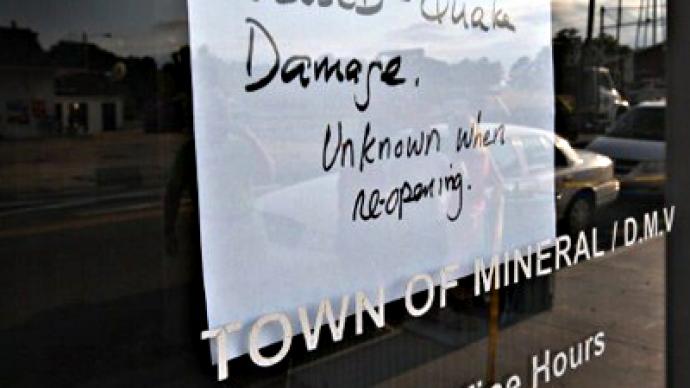Fracking could have caused East Coast earthquake

Experts are looking for a reason behind Tuesday afternoon’s unlikely 5.8 magnitude earthquake that shook people up and down the East Coast, and some are saying that a recent rise in fracking could be the culprit.
Hydraulic fracturing, or “fracking,” is the man-made splintering of underground rocks to expedite the exploiting of natural resources. It’s become a widespread phenomenon since its introduction in 2004, and though the practice can help increase supplies of oil and gas without reaching out internationally for imports, the result it can have on the geological make-up of the Earth can be ravaging. Now some experts say the rise in fracking could be to blame for yesterday’s quake.
The odds of a quake exceeding a magnitude of 5.5 occurring in central Virginia are so slim that Dominion Power determined only around six quakes of that size would occur in the area over the next 10,000 years. Dominion was looking at building a third nuclear reactor at their power plant in North Anna, VA, where facilities had to be taken offline yesterday as a result of the quake. Despite predicting that the site would be scarcely affected ever by a tremor, the quake’s epicenter was only mere miles from the nuclear facility.
Dominion, which confirmed in February that it will be building a third reactor for the plant, was rated by the US Nuclear Regulatory Commission as the seventh most-likely site to receive damage from a quake, taking into consideration the 100-plus plants from coast-to-coast. Even still, the plant had its earthquake-sensing seismographs removed in the 1990s in order to save money.
When sites are subjected to fracking, waste salt water is injected back into the earth once fractures are created; in some cases, as many as 3 million gallons of the waste can be put into the earth in each well. Though earthquakes out east are unlikely, Braxton County West Virginia, only 160 miles from the epicenter of Tuesday’s tremor, has seen eight minor movements in 2010 alone. That site has also seen a slew of fracking operations in the several years before it.
Explicitly, the United States Geological Survey has published a finding confirming that processes like fracking can be to blame for “natural” disasters. "Earthquakes induced by human activity have been documented in a few locations in the United States, Japan and Canada,” writes the USGS. “The cause was injection of fluids into deep wells for waste disposal and secondary recovery of oil and the use of reservoirs for water supplies."
Out West, geologists have blamed fracking on earthquakes that unexpectedly shook up the state of Arkansas, which recently saw over 20 small tremors in a single day. Freak earthquakes have also occurred in regions of Texas, New York and Oklahoma that should not be likely sites of epicenters, though those locales have all seen a rise in fracking in recent years.
Multi-stage fracking, which can drill several miles deep in the Earth, has only become prevalent in recent years. Once introduced, however, Arkansas, West Virginia and Texas all saw an unexpected increase in quakes across the region. The correlation has caused concern in other parts of the country, including West Virginia, where residents are asking lawmakers to reconsider the legality of fracking, which can not only cause earthquakes but is overall detrimental to the local ecosystem. One incident in central Virginia occurred in 2008 when fracking caused an explosion of a natural gas pipeline that created a fireball that stretched up to half a mile long and tall and injured five people.
Mineral, VA, the site of Tuesday’s quake’s epicenter, is only 90 miles from the West Virginia border, where activists are rallying to change the lax state legislation which has caused companies to conduct fracking operations more and more and recent years.












